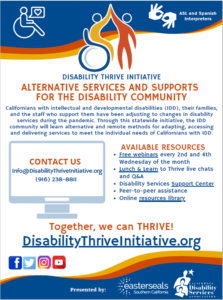LOS ANGELES (AP) — At a time when election officials are struggling to convince more Americans to vote, advocates for the disabled say thousands of people with autism spectrum disorder, cerebral palsy and other intellectual or developmental disabilities have been systematically denied that basic right in the nation’s largest county.
A Voting Rights Act complaint to be filed Thursday with the U.S. Justice Department goes to a politically delicate subject that states have grappled with over the years: Where is the line to disqualify someone from the voting booth because of a cognitive or developmental impairment? Read more.
Disabled Often Banned From Voting
Autism Therapy a MediCal Benefit
State officials said yesterday autism therapy clearly is a covered Medicaid benefit, and they hope to submit a state plan amendment by Sept. 30 to start the process to make it a Medi-Cal benefit for those under age 21.
According to René Mollow, deputy director of benefits and eligibility at the Department of Health Care Services, Medi-Cal children are entitled to applied behavior analysis — known as ABA therapy. Read More.
Obama Signs Law Limiting Sheltered Workshop Eligibility
The transition from school to work for students with disabilities will undergo sweeping changes under a bill President Barack Obama signed into law Tuesday. The measure known as the Workforce Innovation and Opportunity Act significantly limits placements at sheltered workshops and other work environments where people with disabilities earn less than minimum wage.
Under the new law, individuals with disabilities age 24 and younger will no longer be allowed to work for less than the federal minimum of $7.25 per hour unless they first receive pre-employment transition services at school and try vocational rehabilitation services. Read More.
Developmental Center Task Force Reprised
California Health and Human Services Secretary Diana Dooley last week announced she is reconvening the task force for developmental centers.
That task force took on a formidable job — over the course of six months, it came up with a $13 million plan to restructure the state’s developmental centers — and in May presented its “Plan for the Future of Developmental Centers in California” to legislators in time for the state’s budget revision. Read more.
Getting People with Disabilities in the Workforce
At a time when 70 percent of working-age Americans with disabilities are outside the workforce and more than 9 million working-age Americans with disabilities are living on government benefits, I was proud to join the majority of the U.S. House of Representatives in passing bipartisan, bicameral legislation to increase opportunities for people with disabilities by reauthorizing federal investment in disability related workforce training, employment, independent living and research programs.
The U.S. Senate already passed the Workforce Innovation and Opportunity Act (WIOA) by a vote of 95-3. The president is now expected to sign this historic legislation into law. In an era of partisan gridlock, it is an all too rare bipartisan success that will help the American people. Read more.
Expand Access to MediCal Interpreters
Over 40% of Californian’s speaking a language other than English. That’s one of the reasons commercial health insurance plans in the state are required to provide medical interpreters for people who have limited English skills. But there’s a shortage of interpreters available for Medi-Cal patients because the program doesn’t reimburse for the service.
A new Assembly bill would change that. Red more.
Developmental Services Budget Passed
With the Governor beating the deadline and passing the 2014-15 state budget, regional centers have cause to celebrate the Early Start eligibility restoration to the 2009 levels. Other highlights include provisions for payment of eligible persons of insurance deductibles; funding for many regional center funded providers to help with the impact of the State minimum wage increases scheduled for July 1, 2014; increases in rates for supported living services, in-home respite and personal attendant services to fund the impact of the federal overtime requirements effective January 1, 2015; and it implements several recommendations of the Developmental Centers task force. Read more.






